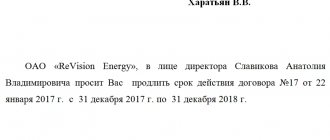Who has the right to initiate termination?
The possibilities for unilateral termination of a lease agreement are provided for by the Civil Code of the Russian Federation and depend on the terms of the contract.
The grounds for termination are:
- agreement of the parties (clause 1 of article 450 of the Civil Code of the Russian Federation). On this basis, the tenant and the lessor have the right to terminate the business relationship at any time agreed upon by them, regardless of the period for which they were concluded;
- notice of termination of the lease agreement at the initiative of the lessor or the tenant unilaterally (Article 450.1, 610 of the Civil Code of the Russian Federation). If the contract is concluded for an indefinite period, either party has the right to send this notice to the counterparty at any time. If the validity period of the transaction is determined, the party has the right to take advantage of the possibility of unilateral refusal if there is such a condition in the agreement. In addition to the above, in the terms of the contract, the lessor and the lessee have the right to provide for various grounds for unilateral refusal of the transaction at the initiative of one of the parties without going to court;
- court decision (Article 619, 620, paragraph 2 of Article 450 of the Civil Code of the Russian Federation). The grounds for applying to court for the purpose of early termination of obligations are provided for by the Civil Code and are associated with violations of one of the parties’ obligations. By law, counterparties have the right to include in the terms of the transaction additional grounds for judicial termination. Before going to court with an application to terminate the lease agreement, we must send a claim to the other party in order to comply with the pre-trial procedure for resolving the conflict (clause 2 of Article 452 of the Civil Code of the Russian Federation, clause 60 of the resolution of the plenum of the Supreme Arbitration Court of the Russian Federation No. 6, plenum of the Supreme Arbitration Court of the Russian Federation No. 8 of 01.07. 1996, Article 619 of the Civil Code of the Russian Federation).
Need a rental agreement?
Draw up any agreement for free using a special agreement designer from ConsultantPlus.
Analytics Publications
Termination of a lease agreement at the request of one of the parties is possible both in court and through a unilateral out-of-court refusal of the party to fulfill the agreement.
Judicial procedure for terminating a lease agreement
At the request of one of the parties, the contract can be terminated by a court decision in the event of a significant violation of its terms by the other party, as well as in other cases provided for by law or contract (clause 2 of Article 450 of the Civil Code).
One of the general grounds for termination of a contract is a significant change in circumstances, leading to the actual loss of interest by a party to the contract in its further performance (Article 451 of the Civil Code). It is extremely difficult to prove such a change to the court. For example, the courts do not recognize a change in the economic situation on the market or a deterioration in the financial situation of one of the parties to the contract as a significant change in circumstances (resolutions of the Presidium of the Supreme Arbitration Court dated April 13, 2010 No. 1074/10, dated November 30, 2010 No. 9600/10, Moscow District Arbitration Court dated February 16, 2016 in case No. A40-22624/2015).
Grounds for termination of the contract at the initiative of the lessor:
- use by the tenant of the property with significant violations of the terms of the contract;
- significant deterioration in the condition of the property;
- failure to pay the fee more than two times in a row after the deadline;
- failure to carry out major repairs when the corresponding responsibility is assigned to the tenant[1].
But in practice, prove the grounds provided for in Art. 619 of the Civil Code, difficult. This is often associated with a subjective assessment of the court - for example, when examining the significance of the violations committed[2].
Therefore, it is in the interests of the lessor to include in the lease agreement additional grounds for terminating the agreement in court. These grounds can be tied to the specifics of the property being leased[3].
It is possible to agree on a condition on the right of the lessor to go to court with a demand to terminate the contract in the event of a one-time delay in paying rent or violation of legal requirements when using the property (for example, rules for the circulation of alcoholic beverages)[4].
Claim procedure.
The procedure for terminating a lease agreement in court is always accompanied by a pre-trial procedure for resolving the dispute.
The general rule on compliance with the claim procedure when terminating contracts: a corresponding claim can be submitted by a party to the court only after receiving the refusal of the other party to the proposal to terminate the contract or failure to receive a response within the prescribed period[5].
There is a special rule for a lease agreement: the lessor has the right to demand early termination of the agreement only after sending the tenant a written warning about the need to fulfill his obligation within a reasonable time[6].
Failure to comply with the mandatory claim procedure will result in leaving the landlord’s claim without consideration[7].
One-time late payment of rent
When the landlord includes in the contract a provision regarding his right to terminate the contract in the event of a one-time delay in payment of rent, tenants often claim that this contradicts paragraph 3 of Art. 619 of the Civil Code, the principle of stability of relations and balance of interests of the parties. The Presidium of the Supreme Arbitration Court, in paragraph 26 of Information Letter No. 66, resolved this issue in favor of the lessor, indicating that the corresponding condition complies with the principle of freedom of contract.
Consequences of the tenant eliminating the violations that served as the basis for filing a claim
The Presidium of the Supreme Arbitration Court clarified this issue in the Review of the practice of resolving disputes related to the conclusion, amendment and termination of contracts[8]. The requirement to terminate the lease agreement cannot be satisfied if the violations that served as the basis for filing an appeal to the arbitration court are eliminated within a reasonable period of time (clause 8 of the Review).
Despite the fact that this position was formed more than 20 years ago, it continues to remain relevant[9]. In 2011, the Plenum of the Supreme Arbitration Court adjusted this approach[10]. He explained that even if the tenant has eliminated the violation of the obligation to pay rent, the landlord has the right to bring an action for termination of the contract within a reasonable time. However, failure to submit such a demand within a reasonable period of time from the moment the tenant pays the said debt deprives the landlord of the right to demand termination of the contract in connection with this violation.
Thus, termination of a contract in court involves the need to prove to the court the existence of special grounds for termination and compliance with various procedural requirements, for example, sending a pre-trial demand to the tenant.
Among other things, consideration of the case by the court will most likely require significant time and material costs from the plaintiff-landlord.
Extrajudicial cancellation of the lease agreement
The optimal option for early termination of a lease relationship is a unilateral out-of-court repudiation of the contract. The right to unilateral refusal is provided for by law only for the termination of a lease agreement concluded for an indefinite period[11].
Therefore, it is in the interests of the lessor to include in the contract additional grounds for unilateral refusal of the contract. You can associate such grounds with the tenant’s violations, or you can add grounds that will not depend on the will of the parties. Moreover, the contract may provide for the right to unmotivated refusal to perform [12].
There are two aspects that will minimize the risks associated with exercising the right of refusal.
- Detail as much as possible the conditions under which the lessor has the right to withdraw from the agreement, in order to avoid the risk of the future refusal of the agreement being recognized as unfounded. It is advisable to list the specific violations of the tenant that may become grounds for refusal, since, for example, the inclusion of an abstract phrase about a “material breach” of the contract in practice may lead to a successful challenge to the refusal. In this case, taking into account the interpretation of the contract and assessment of the behavior of the parties, the court may come to the conclusion that a specific violation is insignificant and there are no grounds for refusal[13].
- Prescribe the procedure for the lessor to exercise the right to unilateral refusal, including the form, content and timing of sending a notice of unilateral refusal.
Failure to comply with the requirements for a unilateral refusal, as a general rule, means that such refusal to fulfill an obligation does not entail the legal consequences for which it was intended[14].
From June 1, 2015, the exercise of the right to withdraw from the contract may be conditioned on the payment of a certain amount of money by the waiving party in favor of the other party. The exception is cases where the right to withdraw from the contract is expressly provided for by a mandatory norm of law, as, for example, in the case of the above-mentioned Art. 610 Civil Code[15].
Thus, as part of the negotiation process, it is necessary to take into account that the tenant may insist on including in the contract a condition on the landlord’s obligation to transfer a fee for refusing to further fulfill the lease agreement.
Recommendations.
It is necessary to assess whether the lessor is ready for certain financial losses - paying a fee for canceling the contract and implementing a simplified procedure for exiting the contract - or for time and material costs during a legal dispute on termination of the contract.
The contract should clearly distinguish between the procedures for extrajudicial and judicial termination of obligations. For example, the inclusion in the contract of a condition about the possibility of “early termination of the contract at the initiative of the lessor” does not provide a clear understanding of whether it is necessary to terminate the contract in court or whether a statement of unilateral refusal is sufficient. Consequently, the court may come to the conclusion that the lessor’s unilateral refusal is illegal as not provided for by the contract[16].
The risk of recovering losses from the tenant due to early termination of the contract and ways to minimize it
In legal disputes regarding early termination of a lease, tenants often demand damages from the landlord. Such losses occur most often for the following reasons:
- the tenant can no longer use the rented premises;
- the landlord, without the consent of the tenant, disposed of the latter’s property, which was not removed from the leased premises;
- the tenant spent funds on repairs of the leased property, which were subsequently not compensated by the landlord.
Let us consider in more detail the approaches of arbitration courts to resolving disputes regarding the recovery of damages on the above grounds.
Claims for lost profits and differences in rental costs
Courts evaluate the grounds of the stated claims from the point of view of proof of facts characterizing the infliction of losses.
As a result of this assessment, the overwhelming majority of courts come to the conclusion that if the lease agreement is terminated on the grounds provided for in it and in accordance with the established procedure, then the negative consequences for the tenant of termination of the agreement cannot be qualified as losses caused by the lessor[17].
In order to avoid recognition of the landlord’s actions of unilateral refusal of the contract as illegal and, as a result, the landlord’s obligation to compensate the tenant for losses caused by such refusal, we recommend not only following the procedure for canceling the contract, but also providing evidence of the existence of grounds for refusal provided for in the lease agreement.
For example, if the contract provides for such grounds for termination as violation of the intended use of the leased premises, then it is necessary to collect evidence confirming that the tenant is violating the corresponding obligation.
For example, a lease agreement provides for the use of premises exclusively for the sale of a certain type of goods, and the tenant also trades in other goods. As evidence of violation of the intended use of the premises, one can use acts of inspection of the range of goods, written explanations from tenants of adjacent premises, invoices reflecting the range of products sold[18].
The right to recover damages arises from the lessee even if he has not concluded a replacement transaction, and in relation to the performance provided for in the terminated lease agreement there is a current price[19].
The current price is the price charged at the time of termination of the contract for comparable goods, works or services in the place where the contract should have been performed. If the current price is not available at the specified location, the price that has been applicable elsewhere and may serve as a reasonable substitute, taking into account transportation and other additional costs.
The Supreme Court noted that the risks of changes in prices for comparable goods, works or services are assigned to the party whose failure to perform or improper performance of the contract led to its early termination[20].
Thus, to protect the lessor from recovering damages associated with the risks of price changes, it is necessary to provide evidence that the early termination of the contract occurred due to non-fulfillment or improper fulfillment of obligations by the tenant.
The recovery of losses associated with the risks of price changes has not yet received significant practical application in the field of rental legal relations. Therefore, it is impossible to draw a conclusion about the approach of the courts to the requirement to recover such damages if the termination of the contract occurred not in connection with the tenant’s violation of its obligations, but as a result of the lessor’s unmotivated refusal of the lease agreement, the right to which is provided for by such an agreement.
Recommendations.
It should be stipulated in the lease agreement that the parties do not consider the lessor’s unmotivated unilateral refusal of the agreement to be a basis for collecting from the lessor the expenses and (or) lost profits incurred by the lessee in connection with such refusal.
It is necessary to provide in the contract a condition limiting the amount of losses associated with the unilateral unmotivated refusal of the lessor from the contract. This will allow the lessor to control its financial risks in case of early termination of the contract.
Request for recovery of damages in the form of the value of the tenant’s property untimely removed from the leased premises
The landlord often has a question about what to do with the tenant’s property that was abandoned (untimely removed) by him after termination of the contract. The landlord's independent disposal of such property may serve as the basis for the former tenant to file a claim for damages in the amount of the value of such property.
The risks of collecting the above damages can be reduced by including in the contract conditions regarding the fate of the property left by the tenant.
First of all, it is necessary to include in the contract the terms and conditions for the removal by the tenant of his property in the event of early termination of the contract. It should also be provided that if the tenant fails to fulfill these conditions, the lessor has the right to dispose of this property in a certain way.
For example, the agreement may include a provision that, after the expiration of the period for the tenant to remove the property belonging to him, the lessor has the right to take the abandoned property into his own ownership, remove such property or transfer it to storage with subsequent collection of expenses from the tenant (or compensate for expenses through the sale abandoned property). The courts recognize this approach as legitimate[21].
Recommendations.
Before disposing of the tenant's property, the tenant should be given a written notice of the need to vacate the premises and informed that the consequence of failure to fulfill the obligation to remove the property will be the landlord's adoption of a decision on the disposal of such property as provided for in the contract.
Request for recovery of damages related to the tenant's expenses for repairing the leased premises and creating inseparable improvements
One of the reasons for the tenant to file a claim for damages in connection with early termination of the contract may be a dispute regarding compensation for the tenant’s expenses for repairs of the leased property.
As a general rule, the obligation to carry out major repairs is assigned to the lessor, and the obligation to carry out routine repairs is assigned to the tenant[22]. However, this rule can be changed by agreement of the parties.
Separable improvements to the leased property made by the tenant are his property, and the tenant's costs for improvements that are inseparable without harm to the property, which are made with the consent of the lessor, are subject to compensation after termination of the contract, unless otherwise provided by the contract[23].
Thus, issues of compensation for expenses for major repairs, as well as for inseparable improvements made by the tenant, can be regulated by the lease agreement differently than provided for in the Civil Code.
Recommendations.
The lease agreement should provide for the procedure for agreeing with the lessor on the costs of major repairs and the conditions for compensation for such costs[24]. An alternative option may be to include in the lease a condition that the tenant is obliged to carry out major repairs at his own expense without subsequent compensation for his expenses by the landlord, including in the event of early termination of the contract.
It is possible to include in the lease a provision that permanent improvements made by the tenant to the leased property remain the property of the lessor, and the tenant's associated costs are not subject to compensation, regardless of whether they are made with or without the consent of the lessor.
An alternative option may be to include in the contract a requirement for mandatory preliminary approval of the tenant's expenses for inseparable improvements as a condition for their compensation, or to establish a procedure for determining compensation for inseparable improvements to be paid by the lessor in the event of early termination of the contract.
[1] Art. 619 of the Civil Code of the Russian Federation.
[2] Ruling of the Supreme Court of the Russian Federation dated March 16, 2018 in case No. A51-30783/2016
[3] Para. 6 tbsp. 619 Civil Code; paragraphs 25 and 26 of the information letter of the Presidium of the Supreme Arbitration Court dated January 11, 2002 No. 66 “Review
practices for resolving disputes related to rent" (hereinafter referred to as Information Letter No. 66)
[4] Resolutions of the Moscow District Court of 05.30.2017 in case No. A40-221743/15, East Siberian District Court of 11.07.2018 in case No. A19-2663/2018
[5] clause 2 art. 452 Civil Code of the Russian Federation
[6] para. 7 tbsp. 619 Civil Code of the Russian Federation
[7] clause 2, part 1, art. 148 agro-industrial complex; para. 2 tbsp. 222 Civil Procedure Code
[8] Information letter of the Presidium of the Supreme Arbitration Court dated 05.05.1997 No. 14
[9] resolutions of the Administrative Court of the East Siberian District dated January 24, 2018 in case No. A19-9388/2017, and the Administrative Court of the Far Eastern District dated January 27, 2015 in case No. A73-8266/2014
[10] clause 23 of the resolution of the Plenum of the Supreme Arbitration Court dated November 17, 2011 No. 73 “On certain issues of the practice of applying
rules of the Civil Code of the Russian Federation on lease agreements"
[11] clause 2 art. 610 Civil Code of the Russian Federation
[12] resolutions of the North-Western District Court of Justice dated January 22, 2018 in case No. A56-77371/2016, and of the Ural District Court of Justice dated April 28, 2018 in case No. A60-36628/2017
[13] ruling of the Supreme Court dated 09.09.2014 in case No. A45-16453/2013
[14] clause 12 of the resolution of the Plenum of the Supreme Court of November 22, 2016 No. 54
[15] paragraph 15 of the resolution of the Plenum of the Supreme Court of November 22, 2016 No. 54 “On some issues of application of the general provisions of the Civil Code of the Russian Federation on obligations and their execution”
[16] Resolution of the AC of the West Siberian District A dated July 26, 2017 in case No. A03-4538/2016
[17] determination of the Supreme Court dated 03/07/2017 No. 309-ES17-676; Resolution of the Court of Justice of the West Siberian District dated October 16, 2014 in case No. A75-11084/2013
[18] resolution of the Arbitration Court of the Ural District dated November 3, 2016 in case No. A50-30927/2015
[19] clause 2 of Art. 393.1 Civil Code; Clause 11 of the Resolution of the Plenum of the Supreme Court dated March 24, 2016 No. 7 “On the application by the courts of certain provisions of the Civil Code of the Russian Federation on liability for violation of obligations”
[21] resolution of the Moscow District Court dated September 21, 2017 in case No. A40-222670/2016
[22] art. 616 Civil Code of the Russian Federation
[23] art. 623 Civil Code of the Russian Federation
[24] decisions of the Far Eastern District Court of June 20, 2017 in case No. A59-548/2015, West Siberian District Court of October 16, 2014 in case No. A75-11084/2013
When to notify the other party about the termination of the rental relationship
If the contract does not stipulate special conditions, then, according to the norms of the Civil Code of the Russian Federation, at any time without giving reasons, a party has the right to refuse only an open-ended lease relationship by sending a notice of termination of the lease agreement:
- 3 months - when using real estate;
- for 1 month - in other cases.
The tenant and the lessor have the right to provide a different period for preliminary notification of the counterparty, for example, in relation to real estate they often agree on 1 month notice.
Sample additional agreement on termination of a tenancy agreement
I think it won’t be too difficult to fill out the header of the downloaded form, in accordance with the sample shown in the photo. You will only need to enter passport data and information about the participants in the transaction who want to terminate it. But as for the date of termination, we should go into more detail here. There are several options:
- If you have come to a mutual agreement, then the termination date can be set arbitrarily, even tomorrow.
- If the contract states that the contract can be terminated, for example, by notifying the other party at least 30 days before eviction, then we add a month to the signing date. This is the case if one of the parties cannot or does not have the desire to do this earlier.
After signing, the tenant must fulfill the conditions of the act of termination of tenancy:
- transfer the apartment under the return deed;
- make rent payments;
- pay off debts on utility bills, if any;
- pay for repairs not performed, if relevant;
- move out and deregister with all cohabitants living in the rented apartment;
The additional agreement must list all tenants who will be evicted from the premises after termination, and also focus on their unconditional agreement with this fact. Now we write the number of copies issued with a broad wave of the hand and the final chord will be the indication of details, the expectation of termination of the contract and the fulfillment of all obligations.
Separately, I would like to note that if you cannot come to a compromise and terminate the rental agreement by agreement of the parties, then first of all, for a pre-trial settlement, you can send a written notification based on the current legislation or documented conditions that were violated. But we will talk in the next article and look at how to do everything most competently and correctly. If you have any questions, suggestions or thanks, leave them in the comments.






